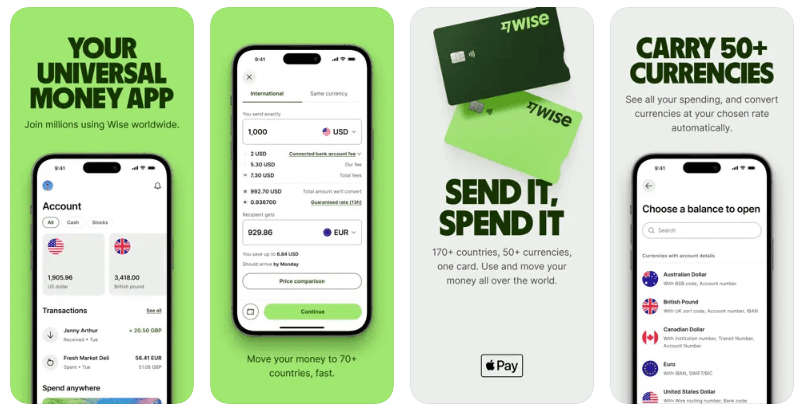How to make money online and from home: Australia guide
How to make money online and from home in Australia: For beginners, students and more

When you’re completing your Australian visa application, you may come across a question asking about non-migrating family members. What does it mean and who qualifies as a non-migrating member of the family unit?
🚦Each individual and family’s immigration situation is unique. So it is best to consult an immigration specialist or someone who can help you through this journey. The information laid out in this article should not be considered professional advice but rather informative on the Australian visa application process.
| 📝 Table of contents |
|---|
| Need to send money to Australia, or back home from Australia? 🚀 Join the over 10 million people that use Wise to send money directly to local bank accounts around the world 🌏💸 |
|---|
Register your free Wise account now
When applying for a permanent or temporary Australian visa, you may be asked about your family members. Even if they are not migrating with you.
Non-migrating members of the family unit mean family members who are not applying for the visa, as per the Australian definition.
The Australian government may require you to list all of them, including Australian citizens who qualify as family members.
There is a chance that non-migrating family members may be required to have a character or health clearance. But not all visas will ask about non-migrating family members, so read the details of your visa application closely to see if you need to include them or not.¹
In Australia, members of the family unit are²:
For your partner, the partnership has to meet certain criteria. You must prove through marriage documents and otherwise if necessary that
De facto partners need to show that their relationship has existed for at least 6-12 months when the application is submitted.³
Dependent children are biological or step children that are still wholly or primarily dependent on you for their basic needs. They are also usually required to be unwed as well. ⁴
| ⚠️Parents, aunts, uncles, cousins, or siblings and their children are not considered part of the family unit by Australian immigration. |
|---|
The Department of Home Affairs 1496i form can provide additional information on qualifying members of a family unit.
Check the documents that may be required to submit along with your application for non-migrating members.
✍ The application may ask for details on each non-migrating family member, including passport details. In case they don’t have a passport, you can just fill in their date of birth and name and leave the passport details blank. ⁵
🔖Any documents that you submit that are not in English will be required to have a certified English translation alongside it. ⁶
If a marriage has taken place abroad, the marriage must be seen as valid and legal under Australian law. A copy of a legal marriage certificate can be attached to your application.
For de-facto partnerships, there should be evidence that your relationship existed for at least 6-12 months prior to submitting an application.⁷
Depending on the type of visa you are applying for, you may be required to provide the following documents to verify your parent-child relationship⁸:
• a certified copy of each child’s birth certificate; or
• a certified copy of adoption papers.
For a child to qualify for some visas they are required to never have been married or in a de facto relationship.
For any child that is over the age of 18, whether migrating or not, you will need to complete the “Form 47A details of child or other dependent family member aged 18 years or over”.⁹
In an instance where it is difficult to verify a family relationship, a DNA test may be required for you and your family member. The DNA test will need to be done through the process the Department of Home Affairs has laid out and you will need to cover the costs of doing so.¹⁰
 (https://wise.com/au/account/)
(https://wise.com/au/account/)
With a free Wise Account your money is no longer limited by what currency it is in. Wise lets you send money in 140+ currencies around the world and directly into a local bank account.
Register your free Wise account now
And whether you need to send it to Australia, friends and family in India or for tuition in Europe, you will always get the mid-market exchange rate and just one low transfer fee with Wise.
Check out Wise to see how much you can save on your next global money transfer 💸
Here are commonly asked questions about Australian visa applications for family members.
A police check can be considered part of a character clearance for a non-migrating family member, but what qualifies may depend on which visa you are applying for. Be sure to read your visa instructions carefully.
No in most cases they are not. If you would like to bring your parents over you will need to apply for seperate visas under the following categories:
• Parent category (subclasses 103 and 804); and
• Contributory Parent category (subclasses 143, 173, 864 and 884).
There are only a limited number of parent visa spots available by the Australian Government under the annual Migration Program.¹¹
The Department of Home Affairs form 1496i is a clear resource to understand who and how family members are considered in the family unit. Read it carefully when you are applying for an Australian visa.
You can pay for your visa application in 4 different ways online:
There is an additional fee depending on which method you use. The Department of Home Affairs also sets their own exchange rate twice a year.
When you submit your application on the Department of Home Affairs website, paying for the visa application will be the last step. ¹²
If the birth is after your application submission but before you have been granted a visa, you are required to tell the Department of Home Affairs as soon as possible. You will need to complete Form 1022 Notification of Change of Circumstances and either upload color copies of your child’s birth certificate to your ImmiAccount or mail a certified copy to the processing office. ¹³
The Form 1022 Notification of Change of Circumstances can be used to remove any members you may have added to your application that don’t qualify as non-migrating family members. You can either submit it to the office where you have lodged your application.
All sources checked as of 15 March, 2021
*Please see terms of use and product availability for your region or visit Wise fees and pricing for the most up to date pricing and fee information.
This publication is provided for general information purposes and does not constitute legal, tax or other professional advice from Wise Payments Limited or its subsidiaries and its affiliates, and it is not intended as a substitute for obtaining advice from a financial advisor or any other professional.
We make no representations, warranties or guarantees, whether expressed or implied, that the content in the publication is accurate, complete or up to date.

How to make money online and from home in Australia: For beginners, students and more

Looking for a travel card to use overseas? We've compared the features, fees, and more of two top travel cards: Revolut vs. Wise.

In this article we’ll walk through the products and services available with Revolut in Australia, as well as the fees you’ll need to think about.

Thinking of transferring money with Revolut? Our guide breaks down their money transfer fees, exchange rates, and limits.

If you’re looking for a way to send money abroad, especially to China, you may have come across Panda Remit. A relative newcomer among money transfer...

Wondering if you can use Alipay in Australia? Our guide explains how it works in Australia, and how to set up the app for in-store and online payments.